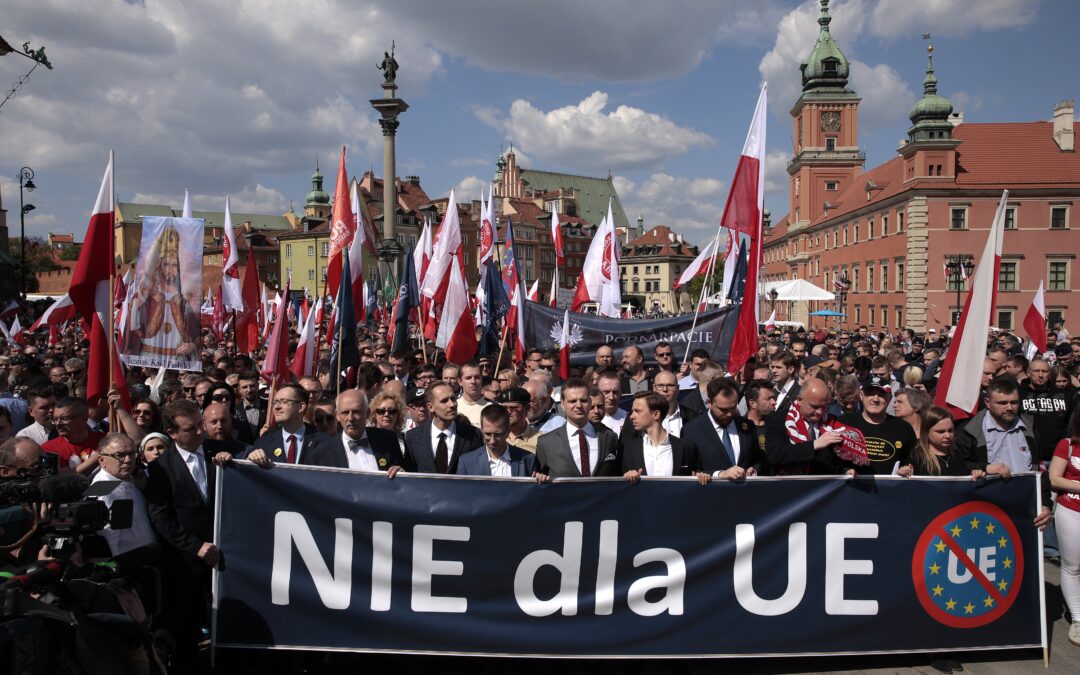Facebook has lifted its ban on far-right party Confederation (Konfederacja), which was suspended from the platform last year due to spreading Covid misinformation and hate speech. The decision has been welcomed by the Polish government, which says the ban violated free speech.
The social media giant says that the end of the pandemic and Poland’s upcoming elections justify allowing Confederation to return. The party is currently running third in polls and is seen as a potential kingmaker in deciding who will form Poland’s next government.
The far-right Confederation is now running third in the polls with double-digit support.
That raises the likelihood of it holding the balance of power after this year's elections and has led to renewed scrutiny of the views of its young new leader https://t.co/jrC2mmxENi
— Notes from Poland 🇵🇱 (@notesfrompoland) April 2, 2023
Although Confederation is currently one of the smallest parties in parliament, with only nine MPs, it has the strongest social media presence of any political group in Poland. Its 663,000 followers on Facebook is almost double the 383,000 who follow the ruling national-conservative Law and Justice (PiS) party.
Since Wednesday last week, Confederation has again been able to reach those followers, after its ban from the platform – imposed in January 2022 – was lifted.
“We are winning against censorship!” wrote the party in its first post after returning, which has so far received 5,700 likes and 1,800 hearts.
Polish far-right party @KONFEDERACJA_ has been banned from Facebook for "repeated violations" of rules against Covid disinformation and hate speech.@Meta's decision was criticised by two Polish government officials, who called it a threat to free speech https://t.co/pH3ocltS2U
— Notes from Poland 🇵🇱 (@notesfrompoland) January 5, 2022
On Friday, Facebook’s owner, Meta, confirmed in a statement to Polish media outlets that Confederation has been allowed back due to changed epidemiological and political circumstances.
“As a result of the announcement by the World Health organisation that the Covid-19 virus is no longer a global health threat, and due to the upcoming parliamentary elections in Poland, we have determined that the public interest now outweighs the risk of direct harm by the party,” said Meta.
The firm did not address the fact that Confederation had been banned not only for spreading Covid misinformation but also for repeated violations of Facebook’s community standards regarding hate speech, including “directly attacking people on the basis of nationality and sexual orientation”.
One of the party’s leaders, Sławomir Mentzen, declared in 2019 that their five-point programme was: “We don’t want Jews, homosexuals, abortion, taxes and the EU.” He later argued that the words had been taken out of context.
During the pandemic, Confederation MPs appeared under a banner saying “Vaccination sets you free” modelled on the sign at Auschwitz and other Nazi German camps saying “Arbeit macht frei” (“Work sets you free”).
“To pięć NASZYCH postulatów. Piątka KONFEDERACJI: nie chcemy Żydów, homoseksualistów, aborcji, podatków i UE”. pic.twitter.com/BaYWE8fbGk
— Koroluk (@KorolukM) March 25, 2023
When the party was banned from Facebook last year, the decision was criticised by government figures, who described it as an attack on free speech. Among them was Janusz Cieszyński, then the prime minister’s plenipotentiary for cyber security and now digital affairs minister.
Last week, Cieszyński hailed Confederation’s return to Facebook. “Pressure makes sense,” he tweeted. “We may disagree, but for PiS freedom of speech will always be the most important.”
The minister told Wirtualne Media that the government had “a series of meetings at the highest level” with Meta to “point out that you cannot ban in a non-transparent and selective way, especially profiles that influence the public debate”.
Presja ma sens. Profil Konfederacji na Facebooku wraca. Możemy się nie zgadzać, ale dla @pisorgpl wolność słowa zawsze będzie najważniejsza.
— Janusz Cieszyński (@jciesz) June 7, 2023
Before Confederation’s ban, the government had proposed a new law that it claimed would protect social media in Poland from “totalitarian censorship” by social media giants. However, the bill has not subsequently been introduced.
The head of Confederation’s election campaign, Witold Tumanowicz, however, denied that the government had anything to do with getting the party back on Facebook. He also ridiculed its claims to be fighting censorship, noting that Confederation politicians are rarely invited onto public media, which are under government influence.
Tumanowicz also noted that Confederation is still pursuing legal action against Facebook to obtain an apology and financial compensation for its exclusion from the platform, reports Onet. The party is hoping to obtain millions of zloty from the social media giant, its treasurer Michał Wawer told the Rzeczpospolita daily.
While polls show that PiS remains the most popular party, its current level of support is not likely to be enough to retain a parliamentary majority. That may force it – or opposition parties – to seek an alliance with Confederation to form a government.
A proposed law to tackle "censorship" of Polish social media users has been added to the government's legislative agenda.
It would create a "Free Speech Council", nominated by parliament, with the power to fine internet firms up to €11 million https://t.co/twsj9V3VdD
— Notes from Poland 🇵🇱 (@notesfrompoland) October 5, 2021
Main image credit: Dawid Zuchowicz / Agencja Gazeta

Daniel Tilles is editor-in-chief of Notes from Poland. He has written on Polish affairs for a wide range of publications, including Foreign Policy, POLITICO Europe, EUobserver and Dziennik Gazeta Prawna.




















